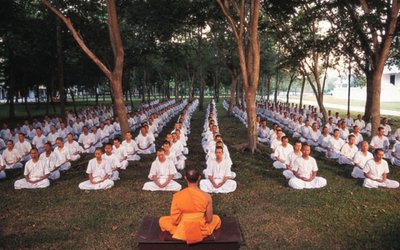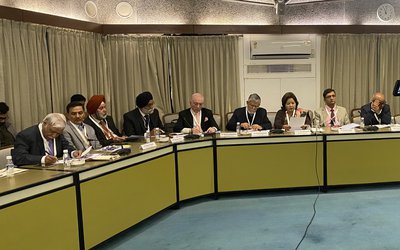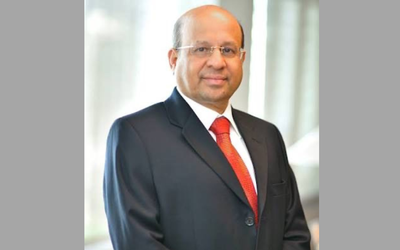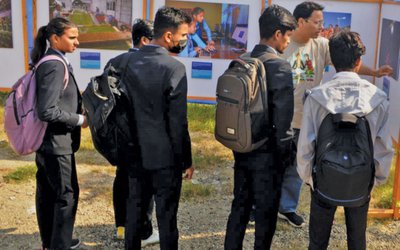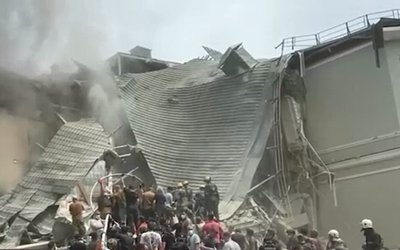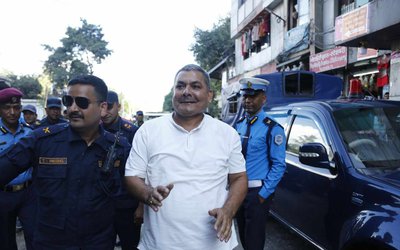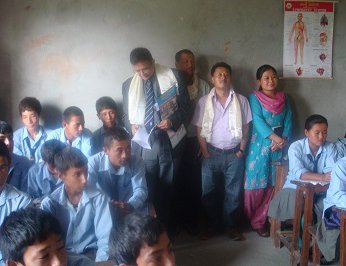
The students enrolled in public and private schools have similar curriculum, text books and more or less similar social and political environment. When it comes to SLC examinations, students enrolled in private schools always outshine the public schools.
Public schools have more qualified and highly paid teachers than private schools, enjoying a greater job security. Despite the low pay and lack of job security, teachers in private schools have been doing much better given the results of SLC.
Although the government teachers receive all salaries and fatty benefits, what they don’t have is any accountability towards the community, schools and students. As the private schools need to be competitive to survive, their management is always concerned about the teaching exercise. This is not so with the government schools. Whether there is a strike or no strike and good results or bad results, public school teachers continue to receive their salaries.
Had the government teachers been made accountable to the students and community, the situation would have been much different with better results. Like in the past, this debate to make the government schools teachers accountable and improve the management of government schools will go in vain a few weeks after the results.
The studies made by various organizations have showed that the government schools are in dire need of reforms. Out of minimum 220 days required to be present in the classrooms, government teachers are absent frequently, with less than 120 days of teaching activities. In remote parts of Nepal, their presence is negligible. As the teachers get involved heavily in local and national politics and remain a tool for political mobilization, they are so influential that they can transfer any official who takes the initiatives to reform the present system.
Along with this, educationists also blame the liberal class promotion policy, ineffective teaching in classroom, students not giving interest in studies as responsible for the decline in pass percentage of the SLC examinations.
Introduced in 2005, Liberal Promotion Policy has a provision of not failing students up to Grade VII in general conditions. Recently, the government even removed prequalification examination test in the grade 10. "The poor result is the consequence of the same policy," said the educationists.
In this year's SLC exam results, published recently, only 41.57 (167,935) percent out of total 511,165 regular students passed the exams, and that 8,318 (7.76%) became successful out of a total of 107,229 appearing for the SLC exam as exempted students.
The educationists also hold the view that political parties need to be responsible to increase the pass percentage in the SLC examinations. As long as political parties continues to use teachers for political mobilization, nothing can change.
As public schools are not being kept under the chain of command of Principal, the schools are turning into centre of politics instead of learning. These are the causes for the poor SLC results.
Costly Reform
Pushing reforms in the education system is not easy at all as there are many vested interests who can easily target the individuals who take the initiative. Dr. Som Lal Subedi, who is now secretary at the National Planning Commission, is a good example of how a secretary got transferred when he took an initiative to reform the school management system. Bringing 23 points program, Dr. Subedi, among others, had made efforts to make teachers at public schools accountable to the community.
Along with making efforts to streamline medical college affiliation process, Dr. Subedi also issued direction to teachers saying that taking party membership was against the spirit and provision of Education Act. Teachers can take the membership of trade unions but not a party membership. He tried to make overall reform in education system possible.
From introducing certain teaching criteria for teachers of public schools and barring teachers to take active membership of the political parties, Secretary Dr. Subedi took many reform initiatives to improve the quality of education at public schools. Thanks to his direction, public schools have increased the class hours even continuing the teaching up to 4 PM all the days in weeks adding additional 12 hours in a month.
Twenty-three 23 points directives issued by secretary Dr. Subedi is still relevant. This included effective monitoring at class XI and X to bring about better results in SLC. He also proposed reward for good performers developing performance indicators and minimum standards in public schools.
The sudden transfer of Dr. Subedi has shown that those who take the initiative for reforms in the education system have no future. Given such a situation, nothing can bring any substantial change in the public schools, which is a guarantee to the continuous poor results in the SLC.
“The time has come to delink politics and teaching. Teachers can hold political views but they should not be allowed to take party membership,” said former education minister Govinda Raj Joshi. " Along with this, there is the need to take reforms in school management.”
Having long experiences in the education sector, former Education secretary Balananda Paudyal holds the view that confusing accountability is the main reason behind the current failure. “There is the need to take drastic reforms in school management system making the teachers more accountable to the community and principal. Bread and butter of private school teachers depend upon the performance of the schools or the results the schools achieve in the SLC examination. This forces the management of private schools to pay more attention on the students in preparing the SLC examination. However, this is not so with the public schools,” said Paudyal.
Another factor is irregularities in teaching learning routines. According Nepal Education Act, there should be at least 216 class days in schools. However, the teaching days are rarely 160-170 days, due to public holidays, general strikes and other activities.
Teacher’s position is based on influence not on the basis of needs. There are no criteria for teacher appointment. There is a lack of political commitment to make teachers accountable towards the clients. Teacher’s accountability lies on education officers. The teachers are not accountable for community.
The recent SLC result is the fallout of all these actions where over eighty percent of students who appeared in SLC through public schools failed in School Leaving Certificate Examination. Thanks to the contributions of private schools, the total pass percentage reached 43.92 percent. Almost eighty percent students enrolled in private schools passed out compared to 18 percent in public schools. As long as the public schools are mismanaged, nothing can bring changes in the overall scenario.
Failure of Policy or Failure of System
Introduced almost two decades ago, Nepal’s present education policy has not lost its relevance. Prepared by renowned educationalists former Vice chancellor of Kathmandu University Dr. Suresh Raj Sharma, former vice chancellor of Tribhuwan University Kedar Bhakta Mathema, former secretary of Education Ishwori Prasad Upadhyaya and former member of National Planning Commission Professor Dr. Tirtha Khaniya, the present education policy is open to everything.
“Our policy has enhanced public and private sector participation in higher education - institutional innovation and market oriented education. We have made higher education free from strict rules and regulations of the government and universities. As other countries in the world, higher education in many countries is seen as a means of trade,” said Joshi (see interview).
With a view to respond to the need of the market and change in the mix of job, universities offer a wide range of new courses and training programs. This has led to emergence of multi-university system, phasing out of certificate level, introduction of three year bachelor degree, involvement of private sector and a wide range of market-driven programs.
Increasing involvement of private sector in higher education has also led to commercialization of education, over-supply of manpower relatively to market demand, low quality, and loss of true spirit of education.
During the last one and a half decade, Nepal has seen fast development in infrastructure. Sound strategic management, coupled with a global vision and a sound grounding in financial and operational decision making, have become more important than ever. The need for educated, professional managers in all sectors of the Nepali economy is now greater than ever. Quality education in Nepal must continue to develop if it is to fulfill this need.
Bleak Scenario
However, the country witnessed the results for the School Leaving Certificate (SLC) last week, which was below par compared to a few years back. This year only 41.57 per cent of the examinees were able to demolish ‘the iron gate,’ a name given to the SLC for its toughness.
The pass percentage has steadily declined in the past four years. It was 47.16 per cent last year, and 64.31 per cent in 2010. The highest pass percentage in the last 10 years was in 2009 when 68.47 per cent of the examinees had cleared the SLC.
Of the 511,165 examinees that eventually appeared for the exam across the country, only 176,253 could get through the gate this year. According to a report, students from the public schools have failed in Mathematics, English, and Science while private schools students have failed in Social Studies and Nepali.
Educationist Bidyanath Koirala said the teachers have been patronized under the protection of the political parties and the students were guided by the trend that with the thinking that nothing can be gained from learning at school and the poor result was its consequence. Koirala holds the view that there would be no increase on the pass percentage unless the political parties were made responsible in this regard, adding that the teachers concentrated their minds to other matters rather than teaching.
“The present results open our eyes. The government will take necessary steps to improve the situation,” minister of education Chitralekha Yadav told New Spotlight. “We have already started evaluation of our management system."
“It is impossible to bring changes in the academic results unless the schools were freed from political interference," said CA member and former chairman of PABSON Dr. Baburam Pokharel.
Given the present political scenario, it will take a long time to make any improvement in the education system. The poor and people from remote parts of Nepal will have to bear the brunt of the delaying in streamlining the school management .

Keshab Poudel
Poudel is the editor of New Spotlight Magazine.
- The Question Arises: Do Former Prime Ministers Prachanda, Nepal, And Dr. Bhattarai Support The Terror actions Of Hamas?
- Dec 11, 2024
- MD KUL MAN GHISING: December 25 Deadline For Upper Tamakoshi
- Dec 09, 2024
- ADB's REFP Reintegration of Returnee Migrants
- Dec 02, 2024
- The Relationship Between Kosovo And Nepal Is Robust: ELBERT KRASNIQUI
- Nov 29, 2024
- ADB’s REFP: Women (Em)Power
- Nov 28, 2024

